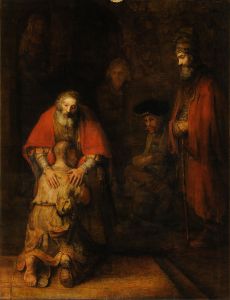mother to Mother
A Poem
by Jane Tawel
September 1, 2017
I have spent many years with you, My Father
Seeing you only as a Father.
And so when my heart has turned away,
I have seen you as absent;
When my nights were dark,
I turned only to your power which seemed to pale
against
the Monsters under my bed.
When I was naughty and sinned against You
I hid from the might of Your Right hand;
As if You would never be able to find me
naked in my temper tantrum.
Your firm judgment weakened my resolve.
For
by treating You only as a Father
I could stay childish.
And alone.
Today Your still small voice
reached out like the grasping hand of
a Woman who never
forgets Her labor pains.
At first I was afraid to come out from my hiding.
I didn’t recognize Your voice when You spoke.
Your Words sounded different
when crooned through the Heart of Your suffering
as You gave birth to Your own birth
in
becoming My Mother.
You, Mommy,
spoke to me endearing my heart with nicknames,
and You called me to Your breast
As my Mother.
I ran awkwardly like a toddler
sensing that I need never be childish or alone with You;
And I knew that I could neither impress nor help You
nor ever make you less of a Mom to me than you were on the day I was reborn.
Because no matter what
I would always be Your beloved child.
You gathered my sad split spirits
to Your Womb,
My tiny- limbed tributary returning gleefully
to its open- armed Source.
And I wept with relief and joy
because You, my Mother
were powerful enough
to die to save me.
And You took my wee small hand
And helped me cross the vast estate
into the motherly loving eternal arms of
My Father.
This poem is a poor response to a phenomenal writer and theologian: Henri Nouwen. Here is a small part of some of Nouwen’s thinking on the painting by Rembrandt and Jesus’ parable:
From Henri Nouwen’s Book The Return of the Prodigal Son: (emphases are my own)
I am convinced that many of my emotional problems would melt as snow in the sun if I could let the truth of God’s motherly non-comparing love permeate my heart.
How hard that is becomes clear when I reflect on the parable of the laborers in the vineyard… Why didn’t the landowner pay those who worked many long hours first and then surprise the latecomers with his generosity? Why instead, does he pay the workers of the eleventh hour first, raising false expectations in the others and creating unnecessary bitterness and jealousy? These questions, I now realize, come from a perspective that is all too willing to impose the economy of the temporal on the unique order of the divine.
It hadn’t previously occurred to me that the landowner might have wanted the workers of the early hours to rejoice in his generosity to the latecomers. It never crossed my mind that he might have acted on the supposition that those who had worked in the vineyard the whole day would be deeply grateful to have had the opportunity to do work for their boss, and even more grateful to see what a generous man he is. It requires an interior about-face to accept such a non-comparing way of thinking. But that is God’s way of thinking. God looks at his people as children of a family who are happy that those who have done only a little bit are as much loved as those who accomplish much.
God is so naive as to think that there would be great rejoicing when all those who spent time in his vineyard, whether a short time or a long time, were given the same attention. Indeed, he was so naive as to expect that they would all be so happy to be in his presence that comparing themselves with each other wouldn’t even occur to them. That is why he says with the bewilderment of a misunderstood lover: “Why should you be envious because I am generous?” He could have said: “You have been with me the whole day, and I gave you all you asked for! Why are you so bitter? It is the same bewilderment that comes from the heart of the father when he says to his jealous son: “My son, you are with me always, and all I have is yours.”
Here lies hidden the great call to conversion: to look not with the eyes of my own low self-esteem, but with the eyes of God’s love. As long as I keep looking at God as a landowner, as a father who wants to get the most out of me for the least cost, I cannot but become jealous, bitter, and resentful toward my fellow workers or my brothers and sisters. But if I am able to look at the world with the eyes of God’s love and discover that God’s vision is not that of a stereotypical landowner or patriarch but rather that of an all-giving and forgiving father who does not measure out his love to his children according to how well they behave, then I quickly see that my only true response can be deep gratitude.
